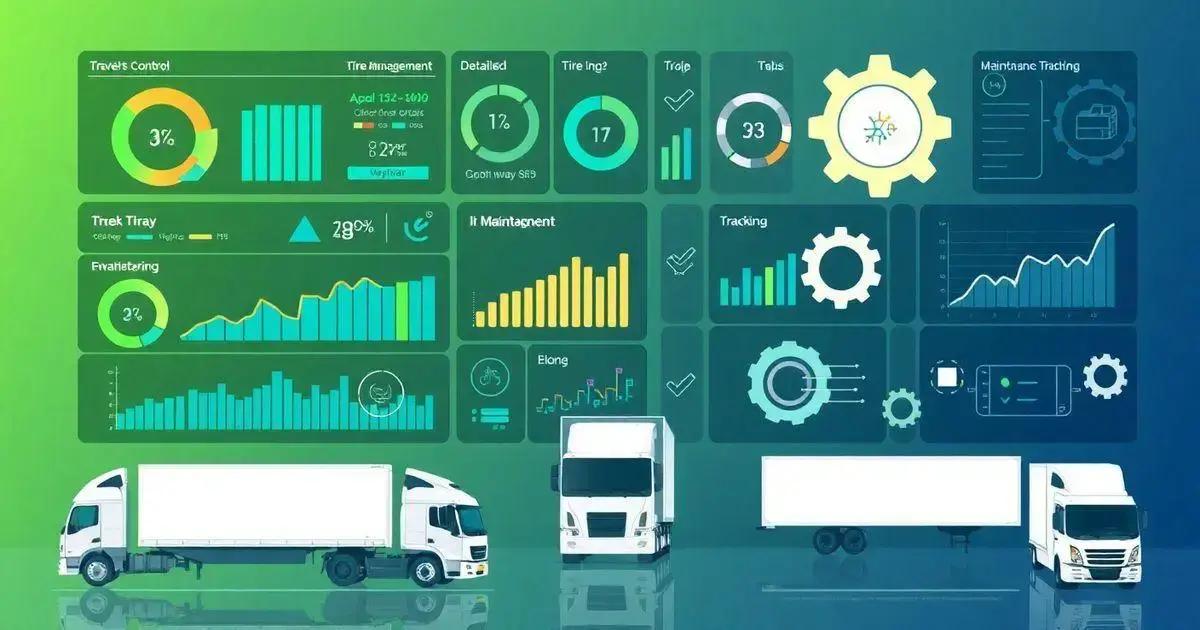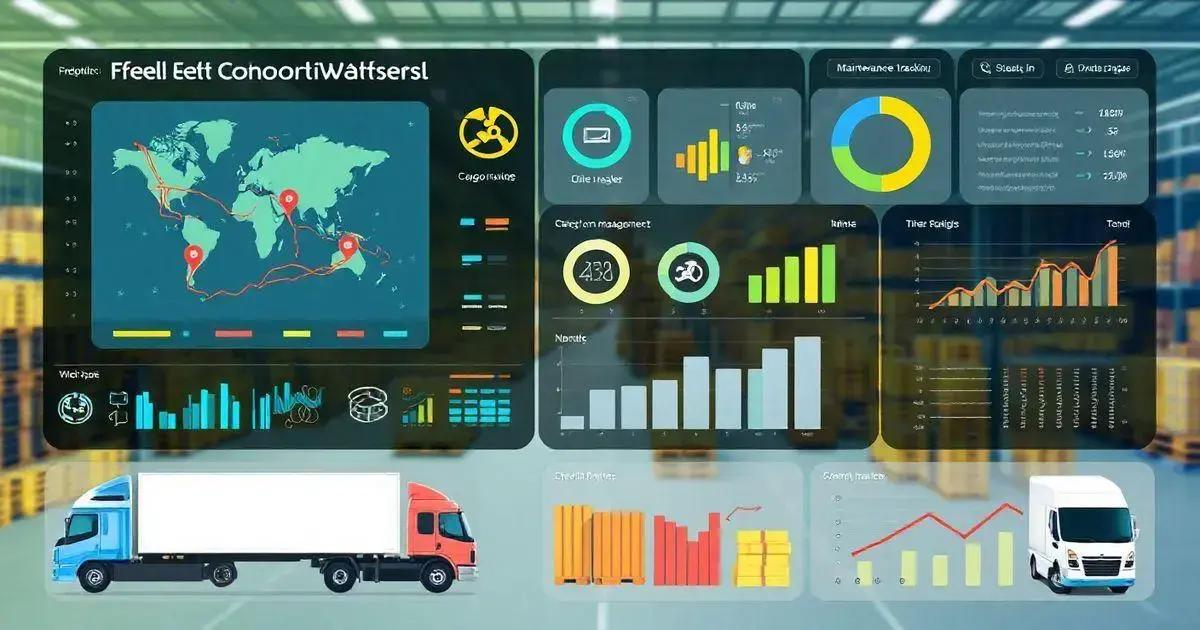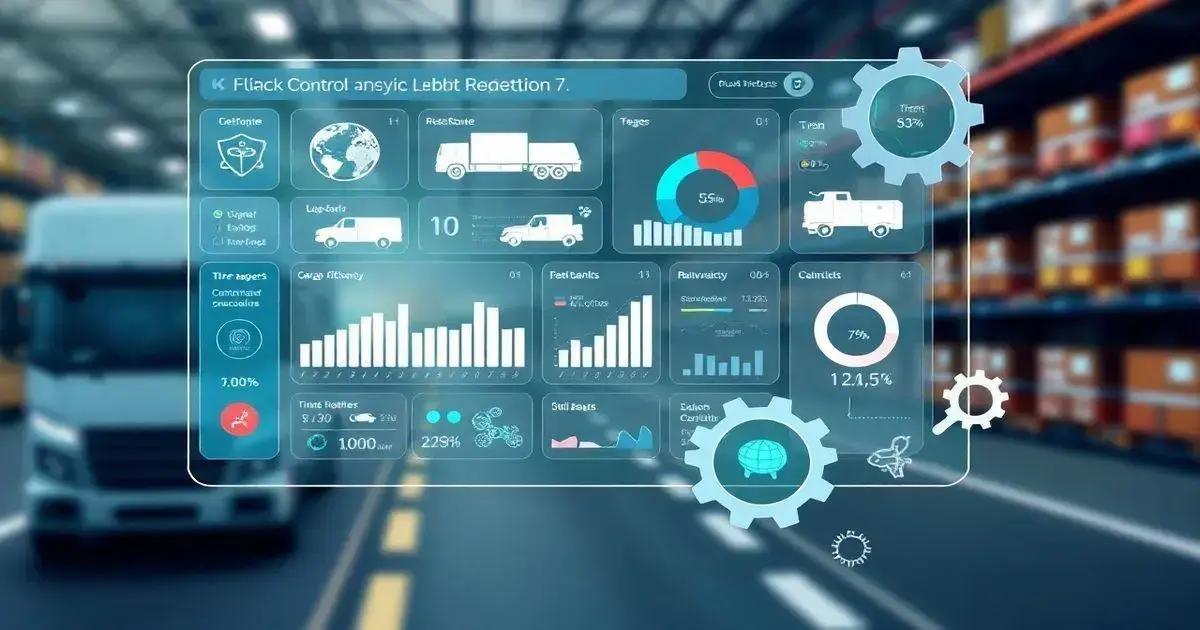Unlock Efficiency: Fleet Control Worksheet 7.0 Leave a comment
The Fleet Control Worksheet 7.0 is a vital tool for fleet managers, featuring dashboards for tracking kilometers, fuel efficiency, and maintenance costs, along with registration, document management, travel control insights, tire management, and maintenance tracking, all aimed at optimizing fleet operations and reducing costs.
The Fleet Control Worksheet 7.0 is designed to revolutionize how you manage your fleet. With features like travel and cargo control, tire management, and maintenance tracking, this worksheet is a must-have for any logistics operation. Whether you’re a small business or a large corporation, optimizing your fleet management has never been easier.
Initial Dashboards Overview
The Fleet Control Worksheet 7.0 comes equipped with a comprehensive set of initial dashboards that provide valuable insights into your fleet’s performance. These dashboards are designed to help you make informed decisions quickly and efficiently.
1. KM by Driver: This dashboard allows you to track the kilometers driven by each driver, helping you identify patterns and optimize routes.
2. KM per Vehicle: Monitor the distance traveled by each vehicle in your fleet, enabling you to assess vehicle utilization and performance.
3. KM per Liter: Keep an eye on fuel efficiency by analyzing the kilometers driven per liter of fuel consumed, which is crucial for cost management.
4. KM per Trip: Evaluate the distance covered on each trip, assisting in route planning and performance assessments.
5. Average Consumption per Vehicle: This metric helps you understand the average fuel consumption of each vehicle, allowing you to pinpoint vehicles that may require maintenance or replacement.
6. Average Consumption per Driver: Similar to vehicle consumption, this metric provides insights into how efficiently each driver operates their vehicle.
7. Total General, Preventive and Corrective Maintenance: Track the total maintenance activities, both preventive and corrective, to ensure your fleet remains in optimal condition.
8. Maintenance Cost Average: Analyze the average costs associated with maintenance, providing a clear picture of your fleet’s operational expenses.
9. Total cost of Mechanical and Electrical Maintenance: This dashboard summarizes the overall costs related to mechanical and electrical repairs, helping you budget effectively.
10. Total Tire Maintenance Cost: Keep track of the expenses related to tire maintenance, ensuring you manage this vital aspect of fleet management.
11. Total Lubricant Cost: Monitor lubricant expenses to ensure your vehicles are adequately serviced.
12. Average cost of Mechanical and Electrical Maintenance: This metric provides insights into the average costs for repairs, enabling better financial planning.
13. Average Tire Maintenance Cost: Understand the average costs associated with tire upkeep to ensure you budget appropriately.
14. Average cost with Lubricants: Assess the average lubricant costs to keep your fleet running smoothly.
15. Vehicles in Transit: Keep track of the number of vehicles currently on the road, providing real-time insights into your fleet’s status.
16. Tires in Transit: Similar to vehicles, monitor the number of tires in use to manage your inventory effectively.
17. Delayed Vehicle Documents: Stay informed about any vehicle documentation that may be overdue, reducing the risk of compliance issues.
18. Delayed Driver Documents: Monitor driver documentation to ensure that all records are up to date and compliant with regulations.
19. Delayed Preventive Maintenance: Keep an eye on any scheduled maintenance that has been delayed, ensuring your fleet remains in top condition.
20. Total Cost Versus Shipping: Analyze the total costs in relation to shipping activities, allowing for better financial management.
21. Fuel, Maintenance and Other Costs: This comprehensive dashboard summarizes all costs associated with fuel, maintenance, and other operational expenses, giving you a clear overview of your fleet’s financial health.
With these dashboards, you can easily visualize key metrics related to your fleet management, helping you to streamline operations and reduce costs.

Registration Features
The Fleet Control Worksheet 7.0 offers a robust set of registration features designed to streamline the management of your fleet’s drivers and vehicles. These features ensure that all relevant information is captured efficiently, making it easier to track and manage your fleet’s operations.
Registration Features
- Driver Registration: This feature allows you to register each driver in your fleet, capturing essential details such as name, contact information, license number, and driving experience. This centralized database ensures you have quick access to driver information whenever needed.
- Vehicle Type Registration: Keep track of the different types of vehicles in your fleet, including specifications such as make, model, year, and capacity. This helps in understanding your fleet’s capabilities and planning accordingly for various operational needs.
- Mechanical and Electrical Services Registry: Document all mechanical and electrical services performed on each vehicle. This registry is crucial for tracking maintenance history and helps ensure that all vehicles are kept in optimal working condition.
- Tree Service Registration: This feature allows you to maintain records of tree services related to your fleet, if applicable. It ensures that all relevant service information is organized and easily accessible.
- Lubricant Services Register: Keep a detailed log of all lubricant services performed on your vehicles. This helps in managing lubricant usage and ensuring that vehicles are well-maintained.
- Register of Workshops and Suppliers: Maintain a list of workshops and suppliers that provide services and parts for your fleet. This register is essential for quickly identifying where to source repairs and maintenance services.
- Expenditure Type Register: Categorize and track different types of expenditures related to your fleet, such as fuel, maintenance, repairs, and other operational costs. This helps in budgeting and financial planning.
- Refueling Station Registration: Document all refueling stations used by your fleet. This can help in planning routes and ensuring drivers know where to refuel.
- Fuel Type Register: Keep track of the types of fuel used by each vehicle in your fleet. This information is vital for understanding fuel consumption and making informed decisions regarding fuel purchases.
With these registration features, the Fleet Control Worksheet 7.0 simplifies the management of driver and vehicle information, enhancing the overall efficiency of your fleet operations.
Document Management
The Fleet Control Worksheet 7.0 includes a comprehensive document management system that ensures all critical paperwork related to your fleet is organized, accessible, and up to date. Effective document management is essential for compliance and operational efficiency.
Driver Document Control: This feature allows you to manage all documents related to each driver, including licenses, certifications, and training records. By keeping these documents organized, you can easily verify that all drivers are compliant with regulatory requirements.
Vehicle Document Control: Similar to driver documents, this feature helps track all documentation for each vehicle, such as registration papers, insurance documents, and maintenance records. This ensures that all vehicles are legally compliant and well-maintained.
With the document management capabilities of the Fleet Control Worksheet 7.0, you can reduce the risk of missing important documentation, streamline audits, and ensure that your fleet operates smoothly and in compliance with all regulations.

Travel Control Insights
The Fleet Control Worksheet 7.0 provides essential insights into travel control, allowing fleet managers to monitor and analyze all travel-related activities effectively. This feature is crucial for optimizing routes, managing costs, and ensuring the safety and efficiency of your fleet operations.
Travel Control Insights
- Cargo Control Linked to Trips: This feature enables you to link cargo information directly to specific trips. By tracking what cargo is being transported on each trip, you can ensure that loads are managed properly and that all necessary documentation is in order.
- Vehicle Control: Monitor the status and usage of each vehicle during trips. This includes tracking which vehicles are in use, their current location, and their availability for future assignments. This real-time information helps in making informed decisions about vehicle deployment.
- Driver Control: Keep track of which drivers are assigned to specific trips and their performance during those trips. This feature allows you to analyze driver efficiency and identify areas for improvement, ensuring that your drivers are operating at their best.
- Supply Control: Manage and track all supplies needed for trips, including fuel, maintenance supplies, and other essential items. By keeping a close eye on supply levels, you can avoid shortages and ensure that your fleet is always prepared for the road.
- Control of All Travel Expenses: This feature allows you to monitor and analyze all expenses associated with travel, including fuel costs, tolls, maintenance, and driver wages. By having a clear overview of travel expenses, you can identify trends and make adjustments to improve cost efficiency.
With these travel control insights, the Fleet Control Worksheet 7.0 empowers fleet managers to enhance operational efficiency, reduce costs, and ensure that all travel activities are executed smoothly and effectively.
Tire Control Features
The Fleet Control Worksheet 7.0 includes advanced tire control features that are essential for managing tire maintenance and ensuring the safety and efficiency of your fleet. Proper tire management can significantly impact fuel efficiency, vehicle performance, and overall operational costs.
Tire Control Features
- Identification for Each Tire: This feature allows you to assign a unique identification number to each tire in your fleet. By tracking tires individually, you can monitor their usage, condition, and service history, making it easier to manage replacements and maintenance.
- Tire Change Schedule by KM: The worksheet enables you to set a tire change schedule based on the kilometers driven. This proactive approach helps ensure that tires are replaced before they become unsafe, reducing the risk of blowouts and accidents.
- Signal of How Much KM is Left to Change the Tire: This feature provides alerts indicating the remaining kilometers before a tire should be changed. By having this information readily available, fleet managers can plan tire replacements efficiently, minimizing downtime.
- Status per Action: Monitor the status of each tire based on specific actions such as allocation to a vehicle, removal from service, scrapping, or maintenance. This helps keep track of tire inventory and ensures that all tires are accounted for and in good condition.
With these tire control features, the Fleet Control Worksheet 7.0 enhances your ability to manage tire maintenance effectively, ensuring that your fleet operates safely and efficiently while reducing costs associated with tire wear and replacements.

Maintenance Control
The Fleet Control Worksheet 7.0 offers a comprehensive maintenance control system designed to keep your fleet in peak operating condition. Effective maintenance management is crucial for minimizing downtime, extending vehicle lifespans, and ensuring safety on the road.
Corrective and Preventive Maintenance Type: This feature allows you to categorize maintenance activities into corrective (repairs after issues arise) and preventive (scheduled maintenance to prevent issues). By tracking both types, you can ensure that all necessary maintenance is performed on time.
Maintenance by Vehicle: Monitor maintenance activities specific to each vehicle in your fleet. This feature lets you track which vehicles require maintenance, their maintenance history, and any upcoming scheduled services, ensuring that no vehicle is overlooked.
Maintenance by Mechanical and Electrical Type, Tire and Lubricants: This capability enables you to categorize maintenance tasks based on their type—mechanical, electrical, tire-related, or lubricant services. Such categorization helps in identifying trends and specific areas where vehicles may need more attention.
Maintenance Cost: Keep track of all costs associated with maintenance activities. This feature provides insights into how much is being spent on maintenance, allowing for better budgeting and financial planning.
Preventive Maintenance Schedule: Establish and manage a preventive maintenance schedule for all vehicles. This proactive approach ensures that regular checks and services are conducted, reducing the likelihood of unexpected breakdowns.
Preventive Maintenance Signal: Receive alerts for upcoming preventive maintenance tasks based on your established schedule. This ensures that you can act on maintenance needs before they become urgent issues.
Status by: Scheduled, Accomplished and Delayed: Monitor the status of maintenance tasks to see which are scheduled, completed, or delayed. This feature helps you stay on top of maintenance obligations and ensures that all tasks are tracked effectively.
With the maintenance control features of the Fleet Control Worksheet 7.0, fleet managers can ensure that all vehicles are well-maintained, reducing the risk of breakdowns and enhancing overall fleet performance.
Conclusion
In summary, the Fleet Control Worksheet 7.0 is an invaluable tool for fleet managers looking to optimize their operations.
With its comprehensive features for travel control, tire management, maintenance control, and document management, this worksheet empowers you to make informed decisions that enhance efficiency and reduce costs.
By effectively tracking driver and vehicle registrations, monitoring travel expenses, and managing maintenance schedules, you can ensure that your fleet operates smoothly and safely.
The insights provided by the initial dashboards further assist in identifying trends and areas for improvement, allowing for proactive management of your fleet.
Investing in the Fleet Control Worksheet 7.0 means investing in the longevity and performance of your fleet.
Whether you are a small business or a large logistics company, this tool is designed to meet your needs and streamline your fleet management processes.
FAQ – Frequently Asked Questions about Fleet Control Worksheet 7.0
What features does the Fleet Control Worksheet 7.0 offer?
The Fleet Control Worksheet 7.0 offers features such as travel control, tire management, maintenance control, document management, and initial dashboards for performance insights.
How can I track maintenance activities for my vehicles?
You can track maintenance activities by using the maintenance control features, which categorize tasks into corrective and preventive maintenance, and allow you to monitor costs and schedules.
Is it possible to manage tire maintenance with this worksheet?
Yes, the worksheet includes tire control features that help you track tire identification, change schedules, and maintenance statuses.
Can I link cargo information to specific trips?
Absolutely! The worksheet allows you to link cargo information directly to trips, ensuring proper management and documentation.
How does the document management system work?
The document management system helps you organize and track all critical documents related to drivers and vehicles, ensuring compliance and easy access.
Is the Fleet Control Worksheet 7.0 suitable for small businesses?
Yes, the Fleet Control Worksheet 7.0 is designed to be versatile and can be used effectively by both small businesses and large logistics companies.

